This article was co-authored by Alexandra Janelli. Alexandra Janelli is a Certified Hypnotherapist, Anxiety & Stress Management Coach, and owner and founder of Modrn Sanctuary, a holistic health and wellness facility in Philadelphia, Pennsylvania. With over 10 years of experience, Alexandra specializes in helping clients push through their roadblocks to achieve their goals using her hypnotherapeutic approach. Alexandra holds a BS from the University of Miami. She graduated from the Hypnosis Motivation Institute with an Advanced Training Graduate Diploma in Hypnotherapy and Handwriting Analysis. Alexandra is also a Certified Life Coach from the iPEC Coach Training Program. She has worked with Academy Award Nominee Actors, world-renowned photographers, singers, top-level executives, and professionals across many sectors of business. Alexandra has been featured on MTV, Elle Magazine, Oprah Magazine, Men's Fitness, Swell City Guide, Dossier Journal, The New Yorker, and Time Out Chicago.
There are 7 references cited in this article, which can be found at the bottom of the page.
This article has been viewed 35,839 times.
If you have a fear of certain weather conditions, it may severely limit your life. It can be difficult to manage the fear of weather because you cannot avoid it or escape it readily. Coping with weather phobias means accepting that the weather is out of your control and by finding ways to cope with your anxiety.
Steps
Preventing and Reducing Anxiety
-
1Start slowly. If you have a fear of thunderstorms and want to ease this fear, begin slowly. For instance, listen to relaxing music with stormy sound effects in the background to acclimate to the sounds of a storm. You can start with nature sounds, then move to storms. Try temporarily distracting yourself by coloring, completing a task, listening to music. You don’t even need to face your fear right away, just start being more comfortable with associations.
- If you use distraction, don’t continue using distraction as a way to cope; use it as a stepping stone. In overcoming a phobia, distraction may not be effective and may interfere with emotional or cognitive processes without helping you to actively cope with your fear.[1]
- If you live in an area with weather threats that you fear, consider minimizing your exposure for a brief time during seasons where threats are more likely. For example, visit family in another part of the country or take a road trip However, don’t allow yourself to continue to avoid situations. It can be part of the starting process, but part of coping with your phobia is gently easing in to face it.
-
2Try exposure therapy. Exposure therapy exposes you to your stressor one bit at a time, increasing the element little by little.[2] For instance, if you have a fear of rain, you may start by looking out the window for 5 seconds while it’s raining. Then, you may focus on the sound of the rain. After that, you may open your window while it rains for a short time period. Then, perhaps you stand in a doorway near the rain. Then, you may reach out your hand and feel the rain. Finally, you may stand under an umbrella in the rain.
- The trick is to introduce a small amount of stress at each exposure, slowly working up until you are able to tolerate the stressor.
Advertisement -
3Call someone for emotional support. If you feel anxious about the weather, call someone and express what you’re feeling. Even if you know that talking about it won’t change the weather, it can be helpful and cathartic to express what you’re thinking and feeling and have someone listen.[3]
- Even if you don’t want to discuss the weather or how you feel, calling a friend can still ease your nerves and help you feel connected.
-
4Practice relaxation. Your body may start to react as a result of experiencing stress and anxiety from your phobia. Much of the fear in experiencing a phobia may be the physical symptoms such as chest pain, difficulty breathing, and racing heart. Learn to manage the anxiety and the physical symptoms by practicing relaxation.[4]
- Use deep breathing exercises. Instead of letting your breath go shallow, practice taking deep breaths from your abdomen. Take a deep inhale and hold for 4 seconds, then exhale for 4 seconds. Do this four times and notice your body more fully relax.
-
5Use visualization.[5] Visualization can help you relax and reduce your fear. If you are in the middle of experiencing your fear, close your eyes and imagine yourself enduring the weather feeling safe and secure. Imagine what it feels like to feel calm despite the weather, and know that you safely get through.
- You can also practice visualization to help prevent future anxiety. Imagine a situation that brings you anxiety (like a snowstorm), and visualize yourself in a safe location feeling secure. Keep practicing this visualization until you feel completely at ease with it.
-
6Challenge negative thoughts. If you’re afraid of bad weather rolling in and you start to feel anxious, start to challenge the thoughts the situation evokes. When a negative thought comes ask, start to ask questions. Ask, “What evidence supports this situation happening? What doesn’t? If this situation does happen, are there any solutions? What would I tell a friend or family member that was in this situation?”[6]
- For instance, you may hear wind and fear a tornado. Ask yourself if there’s any evidence to imply a tornado coming. Have you heard anything on the news or radio? Does your area get tornados? If a tornado did happen, what are the steps you could take to ensure your safety? If you received a call from a friend with a similar fear, what would you tell him? Ask yourself if you are catastrophizing. Was it a gust of wind and not a weather emergency?
Changing Your Habits
-
1Confide in someone. Don’t keep your phobia a secret. Confide in someone you trust about your weather phobia and how it affects you.[7] Ask someone for support in working through your fear and tell them how your phobia makes you feel. You may notice that keeping your fear to yourself and the secrecy of it may intensify the fear.
- Talk to people who won’t feed into your fears but will help you work through them and help you gain perspective.
-
2Cut down on weather media consumption. If you find yourself obsessing over the weather channel, or listening to the radio or tracking weather on the computer compulsively, take a step back. Obsessing about the weather feeds your fear. If you have any obsessive behaviors, consider cutting back on these and eliminating them.
- This also includes calling the weather station or power company.
-
3Avoid making large decisions based on weather. You may fear dangerous driving conditions during a storm and avoid going to work because of this fear. This may result in you missing many days of work. If this fear largely influences your regular life, it’s time to get a strong hold over the fear.[8] If you find yourself making big decisions based on weather (like not leaving your house if the weather is considered dangerous or canceling big plans because of a warning), start taking steps to approach these situations.
- Perhaps you don’t feel safe driving to work, so consider public transportation instead.
-
4Accept uncertainty. You may notice that you like to have certain answers to questions, and have life be predictable. Much of anxiety stems from a fear of uncertainty. One scary thing about the weather is how unpredictable it can be and how quickly it can change. It’s impossible to control the weather, which can lead to fear. Thinking about all the scenarios in which the weather could harm you or destroy things doesn’t make the weather any more predictable. Accept that weather and the impacts of weather are uncertain.[9]
- Ask yourself, “Is life always predictable? Is needing certainty helping me cope with the weather? Do I try to predict bad things as a way to cope with the uncertainty? Is it possible to live with the chance that something negative may even, even if the chance is low?”
- Learn to accept uncertainty in other areas of your life as well. Many events in life are unpredictable, and the more you are able to accept the unpredictability, the less anxiety you can experience.
Seeking Treatment
-
1See a therapist. A therapist can help you work through your phobia and cope more effectively when you feel triggered. A therapist can guide you through exposure therapy and desensitization therapy. Many therapists who work with phobias work in a modality called Cognitive Behavior Therapy (CBT), which approaches thoughts, emotions, and behaviors and finds how they hold you back and how to make them work in your favor.
- If you’ve lived through a natural disaster and now have a fear of weather, seek treatment. Before you treat symptoms of phobia, work through your feelings of trauma first. If your fear has endured for many months (or years), find a therapist that specializes in trauma and engage in weekly therapy.[10]
- For more information, check out How to Choose a Therapist.
-
2Attend a self-help group. Self-help groups can help you meet other people that share similar fears and experiences.[11] You can ask for support and encouragement from people who understand. It’s also a great place to make new friends and build your community.
- Look at mental health resources in your community to see if a group is offered.
-
3Use hypnotherapy. Hypnotherapy helps to desensitize you to weather stressors while in the safety of a therapist’s office. Hypnotherapy may include becoming very relaxed and then being led on visualization journeys by a therapist.
- Hypnotherapy can be a beneficial therapy for a fear of flying in turbulence. Since you cannot predict turbulence on an airplane or readily desensitize yourself to flying in an airplane, a hypnotist can help you create visualizations to help you deal with this fear.
-
4Check out Eye Movement Desensitization and Reprocessing(EMDR). EMDR is used to desensitize someone after a painful memory. This is a good option if there’s a specific memory that led to the phobia. This treatment style has 6 steps that help It aims to sensitize the memories and then work to work through any future encounters.
-
5Consult with a psychiatrist. If your anxiety is severe and greatly impacting your general daily life, you may see a psychiatrist to discuss medications.[12] You may discuss medications with your therapist first, who can refer you to a psychiatrist.
- Many medications can become addicting, so it’s important to use medication in tandem with therapy and not solely depend on medication to ease anxiety.
Expert Q&A
-
QuestionHow will my phobia ever go away?
 Alexandra JanelliAlexandra Janelli is a Certified Hypnotherapist, Anxiety & Stress Management Coach, and owner and founder of Modrn Sanctuary, a holistic health and wellness facility in Philadelphia, Pennsylvania. With over 10 years of experience, Alexandra specializes in helping clients push through their roadblocks to achieve their goals using her hypnotherapeutic approach. Alexandra holds a BS from the University of Miami. She graduated from the Hypnosis Motivation Institute with an Advanced Training Graduate Diploma in Hypnotherapy and Handwriting Analysis. Alexandra is also a Certified Life Coach from the iPEC Coach Training Program. She has worked with Academy Award Nominee Actors, world-renowned photographers, singers, top-level executives, and professionals across many sectors of business. Alexandra has been featured on MTV, Elle Magazine, Oprah Magazine, Men's Fitness, Swell City Guide, Dossier Journal, The New Yorker, and Time Out Chicago.
Alexandra JanelliAlexandra Janelli is a Certified Hypnotherapist, Anxiety & Stress Management Coach, and owner and founder of Modrn Sanctuary, a holistic health and wellness facility in Philadelphia, Pennsylvania. With over 10 years of experience, Alexandra specializes in helping clients push through their roadblocks to achieve their goals using her hypnotherapeutic approach. Alexandra holds a BS from the University of Miami. She graduated from the Hypnosis Motivation Institute with an Advanced Training Graduate Diploma in Hypnotherapy and Handwriting Analysis. Alexandra is also a Certified Life Coach from the iPEC Coach Training Program. She has worked with Academy Award Nominee Actors, world-renowned photographers, singers, top-level executives, and professionals across many sectors of business. Alexandra has been featured on MTV, Elle Magazine, Oprah Magazine, Men's Fitness, Swell City Guide, Dossier Journal, The New Yorker, and Time Out Chicago.
Certified Hypnotherapist & Anxiety and Stress Management Coach The first step in coping with a phobia is to accept and acknowledge that you have it. It's not that you're saying "Oh, I'm going to have this forever," but you're at least giving yourself permission to have that experience and be open to it. The more you try to push it down and tell yourself that it's not okay, the more anxiety, fear, and worry it will create. Plus, it makes it harder to handle the phobia in a logical, rational, and reasonable way.
The first step in coping with a phobia is to accept and acknowledge that you have it. It's not that you're saying "Oh, I'm going to have this forever," but you're at least giving yourself permission to have that experience and be open to it. The more you try to push it down and tell yourself that it's not okay, the more anxiety, fear, and worry it will create. Plus, it makes it harder to handle the phobia in a logical, rational, and reasonable way.
Expert Interview
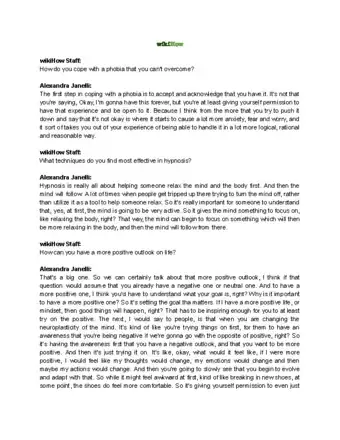
Thanks for reading our article! If you'd like to learn more about coping with phobias, check out our in-depth interview with Alexandra Janelli.
References
- ↑ http://www.ncbi.nlm.nih.gov/pubmed/8347113
- ↑ http://www.nhs.uk/Conditions/Phobias/Pages/Self-help.aspx
- ↑ https://www.helpguide.org/articles/anxiety/phobias-and-irrational-fears.htm
- ↑ http://www.helpguide.org/articles/anxiety/phobias-and-fears.htm
- ↑ http://www.nhs.uk/Conditions/Phobias/Pages/Self-help.aspx
- ↑ http://www.helpguide.org/articles/anxiety/phobias-and-fears.htm
- ↑ http://www.helpguide.org/articles/anxiety/how-to-stop-worrying.htm
- ↑ https://www.psychologytoday.com/blog/fighting-fear/201509/fear-the-weather
- ↑ http://www.helpguide.org/articles/anxiety/how-to-stop-worrying.htm
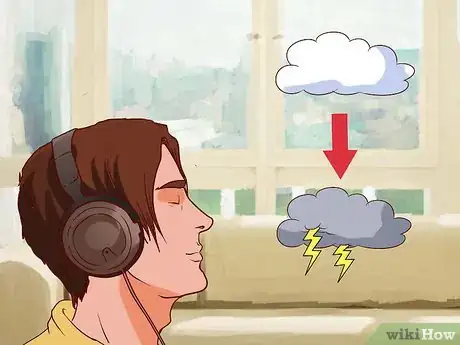

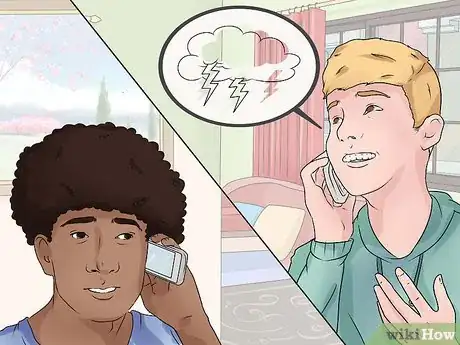




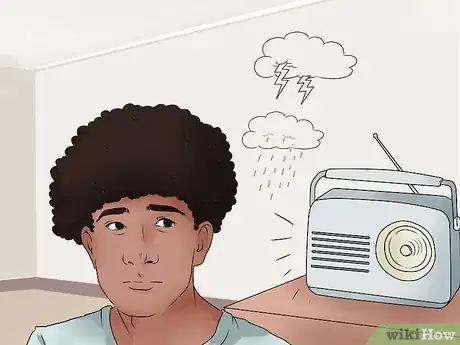


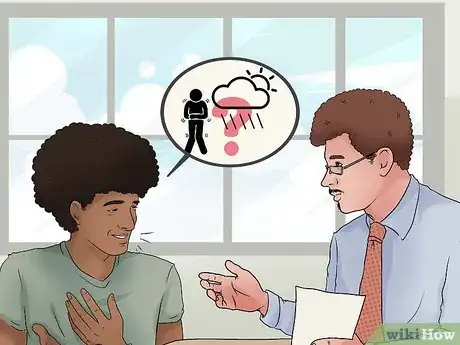
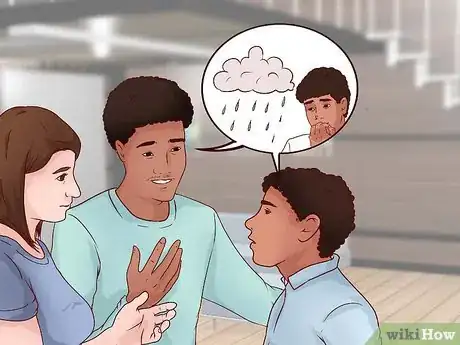
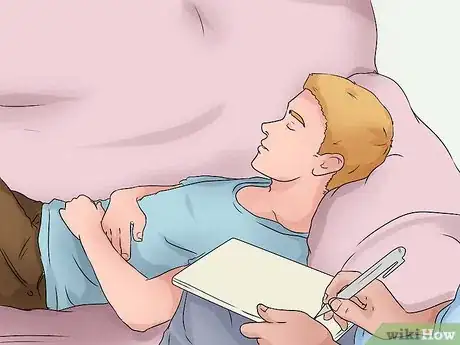

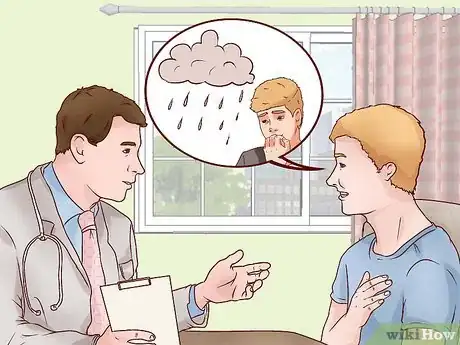




























































Medical Disclaimer
The content of this article is not intended to be a substitute for professional medical advice, examination, diagnosis, or treatment. You should always contact your doctor or other qualified healthcare professional before starting, changing, or stopping any kind of health treatment.
Read More...